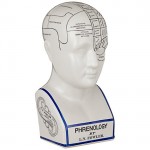Online behaviour predicts personality… no big surprise
 Angus McDonald
Angus McDonald
Notable pieces of academic research too often fail to receive the public attention they deserve. Not so with a recent article entitled ‘Computer-based personality judgments are more accurate than those made by humans’, which has attracted a flurry of media interest.
Online behaviour is being increasingly mined by psychologists, as vast amounts of information gathered through our everyday use of the internet is readily available to test out their ideas. The team in this study used data from Facebook to predict users’ personality according to the Big Five dimensions (Openness, Conscientiousness, Extraversion, Agreeableness and Neuroticism). Using a sample of over 80,000 Facebook users, they first asked them to complete a Big Five personality questionnaire then looked at how this predicted their Facebook ‘likes’. Having established links between the Big Five and Facebook likes in part of the sample, they then used this information to predict behaviour in further samples of users.
There is much existing research looking at how our judgments of our own personality compare to judgments made by others such as friends, colleagues and partners. This provided a useful benchmark against which the predictions generated from Facebook likes could be compared. The research team found that computer-based predictions of users personality were significantly more accurate than human judgments. The accuracy of prediction varied according to the number of likes a user had, but it took only around 227 likes for the computer to predict a user’s personality as well as a spouse – the best human judge. It took only 10 likes for prediction to be better than the average work colleague.
So we’re constantly told that our online behaviour reveals much about us. Be careful with our passwords, bank account details and don’t post anything too offensive as you never know who’s looking. But what about something as personal as our preferences and characteristics, an important part of what makes us unique individuals?
Well, the answer is that Facebook behaviour revealing something about our personality should come as no surprise at all if we stop and think about how personality assessments work.
The areas of personality assessed by questionnaires – often referred to as ‘constructs’ or ‘factors’ – cannot be directly observed as they lie deep within our minds. However, where we stand on these constructs, whether we are high, low or somewhere in the middle, influences our behaviour. Anyone who has completed a personality questionnaire will probably
remember being faced with a long list of questions asking about their typical behaviours, preferences and similar. Each question aims to get at a specific behaviour and tells us a little more about the respondent. Together they build an accurate picture of the respondent’s personality. If personality assessment relies on knowing about behaviour, it should be of little surprise that our behaviour tells us something about our personality. If it didn’t, personality assessment wouldn’t work.
Like any behaviour, how we interact with technology such as Facebook reveals something about our personality. It’s no great surprise that if you observe enough of a person’s behaviour, whether through spending time with them, analysing their likes on Facebook or other online activity, you get to understand about their characteristics. This is, in fact, one of the main reasons that personality assessments are useful; by knowing a person’s characteristics you are able to predict with moderate certainty how they are likely to behave across a range of situations. Without this element of prediction, personality assessment would be no more useful than a parlour game.


